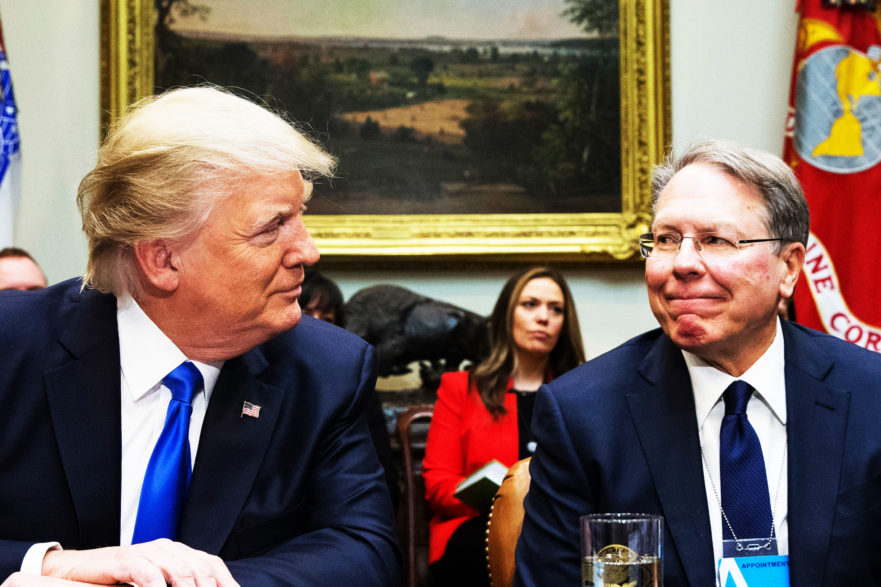NRA Executive Vice President and CEO Wayne LaPierre sits with President Donald Trump during a meeting regarding Supreme Court Justice Neil Gorsuch’s nomination on on February 1, 2017. Photo by Michael Reynolds; Pool/Getty Images.
The House is set to vote Wednesday on a bill that would loosen restrictions on concealed firearms by allowing gun owners to transport weapons across state lines. The legislation is a top priority for gun rights groups like the NRA and a cause for concern for groups like the NAACP and Everytown for Gun Safety.
Proponents of the Concealed Carry Reciprocity Act claim that the bill addresses concerns about domestic violence, but the legislation actually makes it easier for an abuser to access and possess a concealed weapon in any state.
U.S. Rep. Richard Hudson (R-N.C.), who introduced the legislation, said he gained support last month after a shooting left 26 people dead at a church in Sutherland Springs, Texas. He noted that a man with his own gun was able to shoot the gunman, Devin Kelley, and save people from additional harm.
By law, Kelley should not have had a firearm because of two charges of domestic violence that led to his court martial, conviction, and bad conduct discharge from the Air Force. The Air Force, however, never reported the conviction.
By forcing states to honor concealed-carry licenses issued by less stringent states, Hudson’s legislation would enable people denied a gun in one state to purchase one in a state that has fewer guidelines for a background check and then bring it back across state lines.
Hudson’s legislation “would make it terrifyingly easy for abusers to legally carry concealed firearms into other states when stalking their victims,” according to the National Coalition Against Domestic Violence.
“One of the most effective ways to minimize the harm associated with domestic violence is to ensure that a person who has a history of perpetrating domestic violence does not have easy access to firearms,” public health analyst and author Sara Gorman wrote for Quartz.
According to the FBI’s crime database, 6,875 people were killed with a firearm between 2006 and 2014 by a spouse or someone they had been romantically involved with. A study published last month by the American Journal of Epidemiology found that in states where convicted domestic abusers are barred from purchasing a gun, there were fewer people fatally shot by their partners.
Gun control group Everytown for Gun Safety said Hudson’s bill “is a chaotic and dangerous policy that would gut every state’s gun laws and make our communities less safe.” The group has spent more than $900,000 lobbying on the issue this year, according to the Center for Responsive Politics, and lobbied extensively on this particular legislation. The bill has 213 cosponsors, many of whom have taken campaign contributions from the NRA.
Current legislation in 35 states prevents convicted abusers from carrying a concealed firearm. Hudson’s bill stands to undermine state laws aimed at stopping domestic abusers from purchasing guns or keeping ones they already own, issues not addressed by federal law. Current federal law also does not prevent a boyfriend or other romantic partner not recognized by law from owning a gun, while it does prevent a current or former spouse.
Hudson wrote in the Washington Examiner that his bill addresses concerns such as these: “H.R. 38 will not arm criminals or dangerous individuals . . . [including] criminals convicted of a misdemeanor crime of domestic violence, and individuals subject to a restraining order for harassment, stalking, or threatening.”
Hours after the House votes, at a church just blocks from the Capitol, activists plan to hold the fifth annual National Vigil for All Victims of Gun Violence to commemorate the 2012 Sandy Hook Elementary School shooting and the hundreds of thousands victims of gun violence in the U.S.


